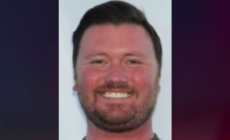-
Denny Hamlin to miss NASCAR’s Mexico City race following birth of son - 4 mins ago
-
Dog Walker Arrives, Has ‘Absolute Worst Feeling’ Over What She Finds - 14 mins ago
-
Michael Avenatti gets nearly eight more years in prison at resentencing - 22 mins ago
-
Walmart heiress Christy Walton promotes “No Kings” anti-Trump protest in ad - 28 mins ago
-
Former funeral director sentenced for keeping woman’s remains in hearse for 18 months - 30 mins ago
-
Sky News reporter describes talking with Air India crash survivor - 36 mins ago
-
2026 World Cup: Shaboozey, FOX Sports kick off one year to go from soccer’s biggest event - 47 mins ago
-
‘How To Train Your Dragon’ Director Defends Live-Action Remake Changes - 52 mins ago
-
Photographer captures Sen. Alex Padilla’s takedown - about 1 hour ago
-
Candace Cameron Bure, 49, shares tropical vacation photos in string bikini - about 1 hour ago
Brian Wilson dead: Beach Boys musical genius dies at 82
Brian Wilson, the musical savant who scripted a defining Southern California soundtrack with a run of hit songs with the Beach Boys before being pulled down a rabbit hole of despair and depression when his highly anticipated masterwork was shelved unfinished, has died. He was 82.
Wilson’s family announced his death Wednesday morning on Facebook. “We are at a loss for words right now,” the post said.
“Please respect our privacy at this time as our family is grieving. We realize we are sharing our grief with the world,” said the statement, also shared on Instagram and the musician’s website.
The statement didn’t reveal a cause of death. Wilson died more than a year after it was revealed he was diagnosed with dementia and placed under a conservatorship in May 2024. Wilson for decades battled mental health issues and drug addiction.
Roundly regarded as a genius in the music studio, Wilson wrote more than three dozen Top 40 hits, bright summertime singalongs that were radio candy in the early 1960s, anthems to the surf, sun and souped-up cars.
In an era when rock groups were typically force-fed material written by established musicians and seasoned songwriters, Wilson broke the mold — writing, arranging and producing a stream of hits that seemed to flow effortlessly from the studio.
Riding the crest of peppy, radio-friendly songs like “Surfer Girl,” “California Girls” and “Don’t Worry Baby,” Wilson was given nearly unchecked control over the group’s output by Capitol Records. The label came to hold Wilson in such high regard that it even let him record where he wished rather than use the cavernous Capitol studios in Hollywood that the Beach Boy leader felt were suitable only for orchestras.
“There are points where he did 37 takes of the same song,” said William McKeen, who teaches a rock ‘n’ roll history course at the University of Florida. “One track will be someone singing “doo, doo, doo” and the next will be “da, da, da.” Then you hear them all together and, my God, it’s a complex piece of music.
“And he heard it all along.”
In many ways, the studio became Wilson’s primary instrument, just as it had been Phil Spector’s. As his confidence grew, Wilson’s compositions became more majestic and complex as he pieced together a far-reaching catalog of music while his band mates toured the world without him — just as he preferred.
When the group returned from a tour in Asia in 1966, they discovered that Wilson had created an entire album during their absence. He’d written the songs — many with guest lyricist Tony Asher, used the highly regarded Wrecking Crew session musicians to record with him and regarded the nearly finished product as essentially a solo album. All his bandmates needed to do, he explained, was add their voices.
The songs on “Pets Sounds” were achingly beautiful and introspective. Some were melancholy, wistful, brimming with nostalgia. Gone were the waves, the sunshine and the blonde-haired girls that populated his earlier work — replaced with interlocking songs that seemed to form a single piece of music.
His bandmates were dumbstruck. Mike Love, his cousin and lead singer of the group, told him the album would have been better had he had a bigger hand in its creation. “Stop f— with the formula,” he reportedly snapped. Other band members agreed that the songs seemed foreign compared to surefire crowd pleasers like “Surfin’ U.S.A” and “Dance, Dance, Dance.” But they relented, and the album was released.
Love, in a lengthy 2012 L.A. Times op-ed about his brittle relationship with Wilson, told it far differently, however. He said he was an early champion of the album, wrote some of the songs, came up with the title of the album and helped convince Capitol to get behind the record when the label dragged its feet.
Though “Pet Sounds” was the first Beach Boys recording not to go gold — at least not immediately, it was a virtual narcotic to critics and admirers. Paul McCartney said it was “the classic of the century” and, as the story goes, rallied the rest of the Beatles to record “Sgt. Pepper’s Lonely Hearts Club Band” in response. Classical composer Leonard Bernstein declared Wilson a genius and called him one of America’s “most important musicians.”
Critics adored the album and, as the years passed, it became a treasured gem, saluted as one of the finest albums of the rock era and preserved in the National Recording Registry by the Library of Congress. Fifty years after it was released, it was still ranked as the second-best album of all time by both Rolling Stone and Pitchfork, topped only by “Sgt. Pepper’s.”
“Part of Brian Wilson’s genius was his ability to express great complexity within the frame of great simplicity,” wrote Anthony DeCurtis, an author and former Rolling Stone editor.
Then things fell apart.
For months Wilson tinkered in the studio on an album with the working title “Smile” as anticipation built on what it might be and in what direction it might take rock, already shifting quickly in the dawn of the psychedelic era — music, drugs, lifestyle and all. Wilson said the album would be a “teenage symphony to God,” a piece of music so audacious it would unlock the straitjacket he felt was keeping pop music bland and predictable.
The first window into the album was “Good Vibrations,” a 3-minute, 35-second song that featured dramatic shifts in tone and mood with Wilson’s distinctive falsetto soaring above it all. It was an immediate commercial and critical success.
But like a car wreck on the side of the highway, it was also a disturbing sign of the madcap world Wilson now inhabited. Recordings for “Good Vibrations” stretched over seven months, the sonic blips and beeps he was trying to stitch together consumed 90 hours of tape and costs soared to nearly $75,000 — roughly $650,000 in 2022 valuation. All the while, musicians — some bandmates, others hired guns — filed in and out of four different studios, as he searched for perfection.
Not everyone thought it was worth the effort for a single song.
“You had to play it about 90 bloody times to even hear what they were singing about,” complained Pete Townsend, the guitarist and songwriter for the Who. Spector — Wilson’s idol — said it felt “overproduced.” McCartney said it lacked the magic of “Pet Sounds.”
Wilson felt otherwise. When he finished the final mix on “Good Vibrations,” he said it left him with a feeling he’d never experienced.
“It was a feeling of exaltation. Artistic beauty. It was everything.”
The band toured again as Wilson continued work on “Smile,” an increasingly troubled project. He ordered members of a studio orchestra to wear fire gear and then reportedly built a fire in the studio during a recording of “Mrs. O’Leary’s Cow,” which was to be the album’s opening number. He changed studios frequently and turned to veteran recording artist Van Dyke Parks for help with the lyrics rather than wait for his bandmates to return.
When Love listened to the still-under-construction album, he dismissed it as “a whole album of Brian’s madness,” according to the Guardian. Parks, an admired lyricist with his own career to worry about, eventually walked away from the project, spooked by Wilson’s erratic behavior and what he saw as Love’s uncomfortable tendency to bully his cousin.
Whether it was the hostile reaction from his bandmates or the hopelessness of navigating the maze of half-finished songs and sonic fragments he’d created, Wilson put the whole thing aside. It would be decades before he revisited it.
“When we didn’t finish the album, a part of me was unfinished also, you know?” Wilson wrote in his 2016 memoir “I am Brian Wilson.” “Can you imagine leaving your masterpiece locked up in a drawer for almost 40 years?”
Love, who sued Wilson repeatedly through the years to get songwriting credit for dozens of songs he claimed he helped write, bristled at the suggestion he’d upended his cousin’s masterwork.
“What did I do? Why am I the villain?” Love wondered aloud in a lengthy 2016 profile in Rolling Stone. “How did it get to this?
Wilson’s psyche had been fragile for years. He was reclusive at times, spending days alone in a bedroom at his Malibu mansion, where he had a baby grand piano installed in a sandbox and a teepee erected in the living room. He admitted that he suffered from auditory hallucinations, which caused him to hear voices.
And he took drugs by the bucketful.
He was public about his demons. He was mentally ill, he said, consumed with such depression he couldn’t get out of bed for days at a time. He smoked pot, experimented with LSD and got through the day with a steady lineup of amphetamines, cocaine and sometimes heroin. A tall man, Wilson’s weight ballooned to more than 300 pounds, and when he did surface in public, he seemed withdrawn and distracted.
“I lost interest in writing songs,” he told The Times in a 1988 interview. “I lost the inspiration. I was too concerned with getting drugs to write songs.”
It all started in Hawthorne, where Wilson was born on June 20, 1942. The oldest of three boys, he grew up in suburban comfort not far from the beaches that would inspire so many of his early songs.
His father, Murry, was a musician and a machinist; his mother, Audree, a homemaker. Wilson went to Hawthorne High, where he played football and baseball. He earned an F for a composition he submitted in his music class, though decades later the school changed his grade to an A when administrators discovered the composition had become the Beach Boys’ first hit song, “Surfing.” School officials invited him to campus to accept their apology.
At home, he played the piano obsessively. He recalled hearing George Gershwin’s “Rhapsody in Blue” when he was 4, lying on the floor of his grandmother’s house, mesmerized that the composer had captured both a city and an entire era in a single piece of music. He took accordion lessons, but set the instrument aside after six weeks. His father, though, noticed his son had a freakish ability to quickly repeat melodies on the piano.
“He was very clever and quick. I just fell in love with him,” Murry Wilson says in Peter Carlin’s “Catch a Wave: The Rise, Fall and Redemption of the Beach Boys’ Brian Wilson.”
In 1961, with his parents on vacation, Wilson, his brothers, Love and their friend Al Jardine rented guitars, a bass, drums and an amplifier with the food money their parents had left behind and staged a concert for their friends. When Murry Wilson returned home, he was more pleased than angered and encouraged the fledgling musicians to continue. Armed with a handful of songs, the Pendletones — named for the then-popular flannel shirts — began to play at school dances and parties. When they went into the studio to record, a producer changed the group’s name to the Beach Boys and never bothered to tell them.
If it all sounded sunny and carefree, Wilson didn’t remember it that way. He said his father was abusive and seemed to delight in humiliating him, typically in public. It was possible, he said, that his hearing problems stemmed from one of the times his father smacked him in the head.
“I was constantly afraid,” he told The Times in 2002. “That’s what I remember most: being nervous and afraid.”
When the Beach Boys became successful, Murry took over as their manager and increasingly took charge of their business affairs. When money was needed, he overrode his sons’ objections and sold off the band’s publishing company, believing the group had peaked. When the group went on the road, he went with them and fined his sons if they broke his rules — no booze, no profanity, no fraternizing with women. Finally, in 1964, Wilson and his brothers essentially fired their father. Never fully reconciled with his sons, Murry died of a heart attack in 1973.
To some observers, the riddle of Brian Wilson could not be fully explained by the drugs he took, the voices he heard or the depression that smothered him like a blanket. It was more than that.
“My own theory is that he was never able, never quite allowed, to become an adult — and that this, more than anything else, has been the story of his life, and of his band,” wrote Andrew Romano in a lengthy 2012 Newsweek article.
An abusive father, a cousin he regarded as a bully and ultimately a psychiatrist who sought to control his every move, his every thought — all appeared to have a hand in making Wilson who he was.
Eugene Landy was a colorful character by any measurement. He wore orange sunglasses, drove a Maserati with a license plate reading “HEADDOC,” sported a Rod Stewart-style haircut and practiced a brand of pop psychology that was regarded by some as revolutionary. Others, though, saw Landy as a Svengali-like figure, a man who could make Wilson appear to be on the road to recovery while bleeding him of every resource he had.
Hired by Wilson’s wife Marilyn in 1976, Landy had his first meeting with his new client in Wilson’s bedroom closet, the only place where the musician said he felt safe. Landy gradually won Wilson’s trust and, following his belief in 24-hour therapy, moved in with the musician.
The results were immediate. Wilson shed weight, quit taking street drugs and rejoined the Beach Boys on stage for the group’s 15th anniversary. For a man who was so paranoid that he reportedly refused to brush his teeth or shower for fear blood would gush from the faucet, it was a night-and-day change.
But it was a short-lived affair, and Landy was fired when the Beach Boys’ management balked at his fees, which hovered around $35,000 a month — $160,000 in 2022 valuation.
Without Landy, Wilson regressed quickly — back on drugs, overeating, retreating to his bedroom. He separated from his wife and grew apart from his daughters, Carnie and Wendy. Then with a flourish, Landy returned and — armed with a full team of nutritionists, assistants and caregivers — doubled down on his around-the-clock therapy
Landy concluded Wilson suffered from a schizoid personality with manic depressive features — introverted, painfully shy, unable to show emotion. Left untreated, Landy said, Wilson would inevitably swing freely between delusional highs and nearly suicidal lows. He loaded Wilson up on medications — lithium, Xanax, Halcion, among others.
So involved was Landy in Wilson’s every move that in 1988, when the musician released “Brian Wilson” — his first solo album and his best effort in years, Landy was listed as the executive producer and given co-writing credit on five of the 11 songs. Landy’s girlfriend was given co-writing credit on three other songs. Landy became Wilson’s manager, formed a business interest with the musician to share in any profits from recordings, films and books and tried to become executor of Wilson’s estate.
Landy was ousted for good when the state attorney general’s office opened an investigation into his relationship with Wilson, probing accusations that he had prescribed drugs without a medical license and had financially exploited his famous client.
Gary Usher, a songwriter who worked with Landy, told state investigators that Wilson was a virtual captive, manipulated by a man who frightened and intimidated him.
In 1989, Landy pleaded guilty to a single charge of unlawfully prescribing drugs, surrendered his license and moved to Hawaii, where he died of lung cancer in 2006.
Wilson, who rarely said anything negative about anyone, could find little kind to say about Landy in a 2015 interview with Rolling Stone. “I thought he was my friend, but he was a very f- up man.”
Despite the tumult, Wilson kept on recording and performing, sometimes showing glimpses of his former self, yet always doomed to having his every song, his every melody compared to his earlier work.
In 2017, Times rock critic Randy Lewis observed that Wilson seemed chipper and content during a leg of the “Pet Sounds Live” tour at the Pantages Theatre. His voice, once shriveled by years of smoking and other abuses, was “assertive and confident,” Lewis wrote.
Two years later, though, Wilson postponed a leg of his “Greatest Hits” tour to focus on his mental health.
“It is no secret that I have been living with mental illness for many decades,” he wrote in a tender apology to ticketholders. “I’ve been struggling with stuff in my head and saying things I don’t mean, and I don’t know why.”
Through it all, the unfinished concept album he’d put aside hung like a cloud.
A few snippets of the album had been used on “Smiley Smile,” a hurry-up recording in 1967 the Beach Boys recorded to meet contractual demands, and “Surf’s Up,” a 1971 album built around a song of the same name that Wilson wrote for “Smile.”
Nearly 30 years later, an L.A. musician named Darian Sahanaja asked Wilson whether he’d be interested in revisiting “Smile.” The two had come to know each other on the road when Wilson sat in with Sahanaja’s group, the Wondermints.
The master tapes were unlocked, and Sahanaja said he downloaded the tracks and unconnected song fragments, aware that he was handling the very material that had nearly driven its author mad.
As the two worked on a laptop, the harmonies and unwritten connective tissue seemed to return to Wilson, Sahanaja said. They smoothed out transitions, changed tempos to help connect songs and phoned up Parks when they were unable to make out lyrics. If he couldn’t remember a passage, Parks came up with substitute language.
In February of 2004, Wilson’s version of “Smile” finally premiered at London’s Royal Festival Hall. With Wilson on stage, seated at a piano, and Parks in the audience, the crowd roared thunderously as a song cycle that had become nearly mythical in its absence was finally unveiled.
“I’m at peace with it,” Wilson said later, smiling.
Wilson is preceded in death by his wife, Melinda who died in January 2024. He is survived by six children, including daughters Carnie and Wendy who made up two-thirds of the pop vocal group Wilson Philips. His brother Dennis drowned in 1983 while diving in Marina Del Rey and Carl, his other brother, died of lung cancer in 1998.
Source link































